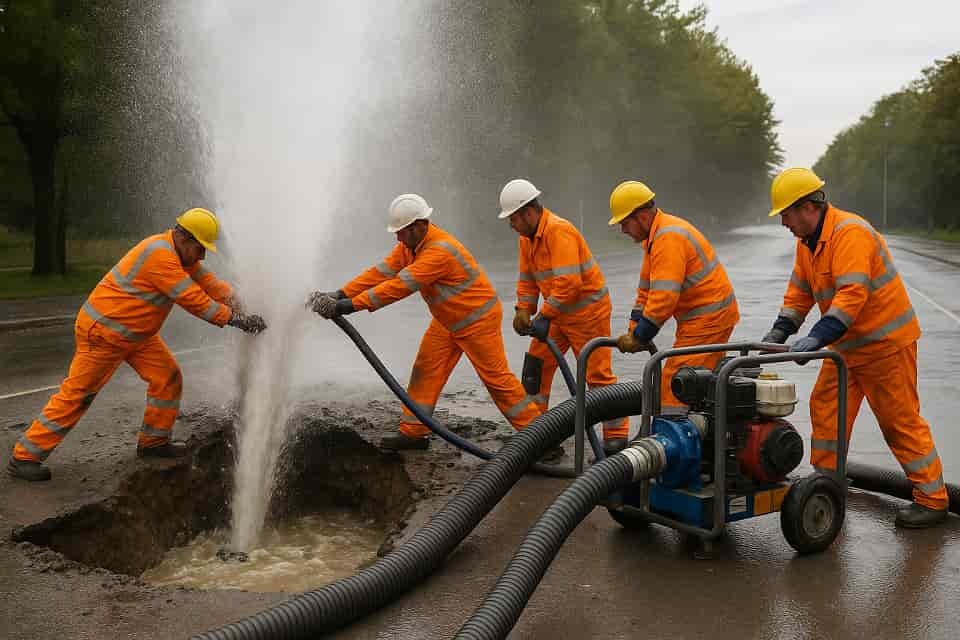In the rolling fields of Cumbria, on the streets of Manchester, and beneath the pavements of London, a silent army of professionals is ensuring that Britain’s most critical resource—water—continues to flow. As we navigate climate uncertainty, population growth, and infrastructure strain, the contribution of water utility workers has never been more crucial.
In 2025, as the UK ramps up its flood protection strategies and reservoir investments to adapt to increasing environmental volatility, it is time to shine a spotlight on those who make it all possible—water utility workers.
Behind the scenes of every drop
From early morning maintenance checks at water treatment plants to emergency call-outs during bursts or flooding, the typical day of a water utility worker is anything but ordinary. These specialists are responsible for overseeing complex water supply networks, repairing vital infrastructure, and maintaining pumping stations, manhole covers, reservoirs, and sewerage systems. Their roles span from on-site engineers and leakage technicians to network control operators and asset planners—all integral to the UK’s 24/7 water provision.
Their commitment was especially evident during recent periods of climate stress. As large parts of southern England faced hosepipe bans due to drought conditions in 2024, water workers redoubled efforts to ensure consistent domestic supply while preparing long-term solutions like advanced leak detection and pipeline upgrades.
Addressing the future: Climate resilience and water investment
The UK government and leading water suppliers are making unprecedented investments in water infrastructure to tackle both drought and flooding. With more than £14 billion earmarked for the next asset management period (AMP8), projects include upgrading old reservoirs, improving wastewater treatment capacity, and fortifying flood defences in vulnerable areas such as Yorkshire, Kent, and parts of the Midlands.
Yet the human UK workforce is the linchpin of this strategy. Flood protection in 2025 isn’t just about concrete walls or predictive software; it’s about boots on the ground—workers wading through rising water levels to protect homes, fields, and livelihoods.
The shift in climate patterns has driven water companies to adapt. Rainfall is more erratic, with short-term flooding events following prolonged dry spells. This has forced innovation not only in water storage and delivery but also in workforce planning. Today’s water workers are as likely to be trained in digital telemetry as they are in traditional plumbing or civil engineering.
Recognising the invaluable role of UK water workers
It is easy to overlook the importance of the individuals maintaining our most precious resource until something goes wrong. But the truth is: every time a tap is turned, a shower enjoyed, or a drain cleared, it is the result of skilled labour performed with professionalism and quiet dedication.
The Workers Union recognises and applauds these contributions. In every reservoir expansion, every pipe relining, and every environmental inspection lies the fingerprint of UK water professionals. Their impact is felt not just in utility systems, but in public health, environmental protection, and economic resilience.
Their work often continues in extreme conditions—through storms, heatwaves, and difficult terrain. As national debate centres on infrastructure resilience and sustainability, it is critical that water workers are not just remembered but celebrated.
Career opportunities in the water sector
With climate adaptation and infrastructure modernisation high on the national agenda, the water sector presents increasing opportunities for employment. Roles now demand a blend of technical skill, environmental awareness, and digital fluency. Whether you are a school leaver considering an apprenticeship, a technician looking to retrain, or a specialist engineer, there is a growing need across the UK’s water companies.
Furthermore, the sector is investing heavily in training programmes, green technology deployment, and AI-driven monitoring systems—providing diverse paths for long-term careers that make a real difference.
The importance of a resilient and secure water supply cannot be overstated, especially in the face of intensifying climate events. But even more critical is the appreciation of the human capital behind this essential service. As the nation looks to secure its water future through technological investment, flood defence, and sustainability measures, The Workers Union takes this opportunity to commend the hardworking individuals keeping the UK’s taps running.




